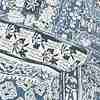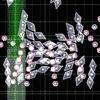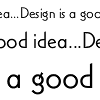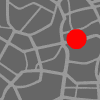|
Gnomedex was great. I enjoyed having WiFi access
during the conference despite my
discomfort with
people paying more attention to computers than people at meetings.
Funniest moment: party the second night, good rock band on
stage, geeks sitting around laptops rather
than dancing or grooving.
Having WiFi definitely hampered my attention to the conference. I'd say 2/3 of the time I was on the laptop I was doing something other than Gnomedex. But at least I was there. And the other 1/3 was doing conference-related stuff, particularly kibbitzing on the talk on an IRC channel. That was pretty rewarding.
Update: Buzz
pointed me to a bit from
Clay with an important insight: it doesn't matter whether you like
WiFi as part of the world or not. It's not going to go away.
I am a bit alarmed at how many offhand comments I made on IRC or at the party ended up at blogs attributed to "Nelson from Google". I'm just another person, I like to relax too. Hard to do that when every word may be replayed. (PS: John, I meant it nicely!) Thanks to iSpot
Access for the WiFi
Just gave my Gnomedex talk; there's already a
goofy
moblog photo of me. There are more photos, too.
I'm experimenting with being online during a conference, even though I said it made me uncomfortable. And I'm liking it. It is a bit of a distraction, but being able network with the community that's here is fun. And IRC is a nice icebreaker.
Today's New York Times article
"In
the Lecture Hall, a Geek Chorus" is about people chatting
online during lectures and talks, creating a side channel. Quotes from
blogosphere luminaries - Clay Gillmor, Cory Ito, Joi Shirky, Dan Doctorow, etc.
people with laptops have realized that they do not have to sit idly
during the presentations. Some people, of course, ignore speakers
entirely by surfing the Web or checking their e-mail ...
But others are genuinely interested in a lecturer's topic and want to
talk concurrently about what is being said
I find people using laptops during meetings and lectures to be rude
and annoying. We go through all this trouble to get people
together in meatspace and then folks aren't paying attention, instead
signaling that they've got more important things to do than
what the group is together for.
But using chat technology to allow a side channel during a lecture does seem useful - it augments the meeting, it doesn't replace it. I particularly like the idea I first heard from Clay; project the chat room logs to the room so the chat becomes part of the event.
Hooray, the US military
killed
two of Hussein's sons. I'm sure democracy and justice for the freedom
loving people of Iraq and Afghanistan won't be far behind. Or maybe at
least electricity and clean water?
 CompuPic
by Photodex is good software. It's an image management application. I use
it to keep track of all the photos I take. The features I use are
quick viewing of hundreds
of thumbnails, the nice full screen viewer and the simple database
abilities. It also has some light digital image manipulation and some
fancy slideshow options I'll never use.
CompuPic
by Photodex is good software. It's an image management application. I use
it to keep track of all the photos I take. The features I use are
quick viewing of hundreds
of thumbnails, the nice full screen viewer and the simple database
abilities. It also has some light digital image manipulation and some
fancy slideshow options I'll never use.
There are a variety of these programs for the PC - ThumbsPlus and ACDSee are popular. I like CompuPic because it was reasonably priced ($40) and because it worked best. The app is very fast: they seem to have optimized a lot of image manipulation algorithms and take advantage of hardware acceleration.  Now you too can own the Nelson
Minor lamp, only $330 from Jonathan Adler. Comes in a
tasteful black
and gold version, too.
Now you too can own the Nelson
Minor lamp, only $330 from Jonathan Adler. Comes in a
tasteful black
and gold version, too.
Jonathan Adler takes lighting to a new level of design with his
sculptural Nelson Minor lamp. A simple black shade highlights the
beautiful shape and detail of the ceramic base.
If you'd rather have a Nelson Minar lamp, I've got one you can have
for five bucks. Lampshade's a bit dinged up but at least it's not
hideously ugly like the Nelson Minor lamp.
Thanks to Marc
 For some reason Macy's has decided that this year men want to buy
short sleeve silk shirts with retro patterns that look like they came
from SquidFingers.
They appear to be wrong; everything's on sale for half price.
For some reason Macy's has decided that this year men want to buy
short sleeve silk shirts with retro patterns that look like they came
from SquidFingers.
They appear to be wrong; everything's on sale for half price.
I saw a demo about a year ago, probably linked to from a blog
somewhere, of a color picker. It wasn't the usual design nightmare
color picker - it was a simple site where you gave it a color, clicked
"generate", and it would randomly pick several other harmonious colors
and show you what a site with that theme would look like.
I need that tool now. Do you know what I'm talking about? I've tried searching Google but am overwhelmed with crap and I can't find it on Memepool or Metafilter.
Update: Many thanks to Chris Pirillo for emailing me
what I was looking for within 45 minutes. The site
is ColorMatch 5k, as seen
on Chris' LockerGnome.
Unfortunately ColorMatch 5k is down right now, but
ColorMatch 10k
does just as well (in twice the space :-). Or this
Flash version.
Todd recommends Color Harmonies.
 Old school shooters like R-Type or Xevious have a degenerate form of
gameplay: the bad guys shoot swarms of very slow moving bullets at you
and the challenge is to find a path through the swarm that leaves you
safe. It's hypnotic and simple.
Old school shooters like R-Type or Xevious have a degenerate form of
gameplay: the bad guys shoot swarms of very slow moving bullets at you
and the challenge is to find a path through the swarm that leaves you
safe. It's hypnotic and simple.
Tuning the bullet swarm is a fine art. So why not describe bullet swarms with XML? BulletML does exactly that. Try the Java applet (select a file other than template.xml, press start, move mouse in upper left window). Or play a stylish Windows shooter that uses BulletML: rRootage. (There's a Mac version, too.) rRootage goes further with Bulletsmorph, using genetic programming to come up with new bullet swarms. Crazy. There's lots of commentary on rRootage, more than you'd think a simple game needed. I think people miss simple shooter games.
As seen on Molelog
 I missed something on MyFont
the first time:
their WhatTheFont?!
service. You upload an image of some text, help the software pick out
individual letters, and then some magic happens and it comes up with a
list of matching fonts.
I missed something on MyFont
the first time:
their WhatTheFont?!
service. You upload an image of some text, help the software pick out
individual letters, and then some magic happens and it comes up with a
list of matching fonts.
Pretty useful but not exact. For instance it can't quite match the Google logo font. The closest match Diaconia is handsome but not quite right - the Google logo font has an odd lowercase 'g' with the connector on the right, not the left. Serifs are off too. Still, WhatTheFont?! is useful for the "find me fonts that look like this" problem. MyFonts credits the University of Birmingham for development of WhatTheFont?!. They also point to Identifont as another font finding tool. Identifont looks like an expert system: answer a bunch of questions and it comes up with candidates.  Another blogger in Iraq, a US soldier at
turningtables.
Frank and cynical, details of daily life that help us
understand.
Another blogger in Iraq, a US soldier at
turningtables.
Frank and cynical, details of daily life that help us
understand.
the ants are back...holy shit they piss me off...they're trying to
escape the heat...one of the drones discovered the climate controlled
comfort of my canvas house...and they went and told all their little
mindless buddies...
He also has a photo
site.
As seen on MetaFilter
I'm going to be speaking at Gnomedex
in a couple of weeks. I've never been to Des Moines before! Should be
a fun grassroots geek conference.
Interesting numbers from
an article worrying about a bond market bubble.
As seen on Metafilter
 I went looking for a font for a project I wanted to do and was happy
to find myfonts.com, a great
online font store.
They have a big collection
of fonts from good foundries and an easy-to-use interface for browsing
and buying.
I went looking for a font for a project I wanted to do and was happy
to find myfonts.com, a great
online font store.
They have a big collection
of fonts from good foundries and an easy-to-use interface for browsing
and buying.
The central problem in font selection is "I need a font that looks like this". myfonts.com tries to help with that - fonts grouped by category, a "fonts like this" button, and even the ability to browse other user's albums of selected fonts. Alas none of it quite works. But if you stumble around you can often find what you need anyway.
Even in 2003 with gay marriages imminent in Canada, mortgage companies
are irrepressibly heterosexist. After I refinanced,
my new mortgage company is not able to put both my name and my partner's
name on the mortgage statements. Apparently they've never heard of two
non-married people sharing a mortgage. And one of the post-mortgage
junk mails we got for life insurance came addressed to
"Nelson and Ken Minar". Um, not quite.
 In celebration of Bush's job creation programs and a 10-year high in
unemployment rate, enjoy the US Department of Labor's
statistics.
Excellent online access to data going back from 1948, things such
as helpful
graphs.
In celebration of Bush's job creation programs and a 10-year high in
unemployment rate, enjoy the US Department of Labor's
statistics.
Excellent online access to data going back from 1948, things such
as helpful
graphs.
Why is it that both Bushes preside over rising unemployment rates?
Microsoft Passport
has been
hacked yet again.
It was the second admission by Microsoft of a serious vulnerability in
Passport since last summer's settlement with the Federal Trade
Commission, which had accused Microsoft of deceptive claims about
Passport's security.
The theory of Passport is that we
trust Microsoft with all our personal data.
Even ignoring the risks of having a convicted predatory
monopolist own all online identity, do we really want to trust
a company with such a horrible security track record?
 Last weekend was a short summer trip up to
Placerville,
CA,
an old Gold Rush town in the foothills of the Sierra Nevada. Fun old
towns and great wineries. Some good things around there:
Last weekend was a short summer trip up to
Placerville,
CA,
an old Gold Rush town in the foothills of the Sierra Nevada. Fun old
towns and great wineries. Some good things around there:
|
||


 Cute little
Cute little